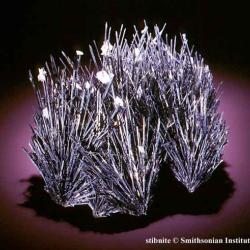Source Institutions
Source Institutions
Add to list Go to activity
Activity link broken? See if it's at the internet archive

Learners will compare the growth rate and appearance of crystals forming on small rocks to those growing on miscellaneous objects. Learners will also investigate how temperature (warm vs. cool room) affects crystal growth. Learners will record their observations at the start and then again after 3 hours, 1 day, and 2 days. This resource includes discussion questions to elicit reflection and help learners draw conclusions. Use this activity to introduce learners to the basics of mineral science as well as the scientific process.
- 5 to 10 minutes
- 1 to 7 days
- $1 - $5 per group of students
- Ages 8 - 14
- Activity, Experiment/Lab Activity, Lesson/Lesson Plan
- English
Quick Guide
Materials List (per group of students)
- ten or more shallow bowls (such as petri dishes)
- five small, clean rocks
- four small miscellaneous objects (such as nails, aluminum foil, shells, or marbles)
- pan for heating, heat source
- spoon and measuring cup
- four cups Epsom salts (magnesium sulfate)
- two cups water
- magnifying glass or microscope
- flashlight
- observation sheets
- food coloring
Subjects
-
Earth and Space Science
-
Earth Structure
- Rocks and Minerals
-
Earth Structure
-
Mathematics
-
Data Analysis and Probability
- Data Analysis
- Data Collection
- Data Representation
-
Geometry
- Solid Geometry
-
Data Analysis and Probability
-
Physical Sciences
-
Chemistry
- Chemical Bonding
- Solutions
-
States of Matter
- Changes of Phase
-
Structure and Properties of Matter
- Atomic Structure
-
Chemistry
-
The Nature of Science
-
The Scientific Process
- Asking Questions
- Conducting Investigations
- Gathering Data
- Formulating Explanations
- Communicating Results
-
The Scientific Process
Audience
To use this activity, learners need to:
- see
- see color
- read
- touch
Learning styles supported:
- Involves teamwork and communication skills
- Involves hands-on or lab activities
Other
Includes alignment to state and/or national standards:
This resource is part of:
- Smithsonian Education: Lesson Plans (Science & Technology)
- Minerals, Crystals, and Gems: Stepping-Stones to Inquiry (lesson plan)
Access Rights:
- Free access
By:
Rights:
- All rights reserved, Smithsonian Institution, 2010
